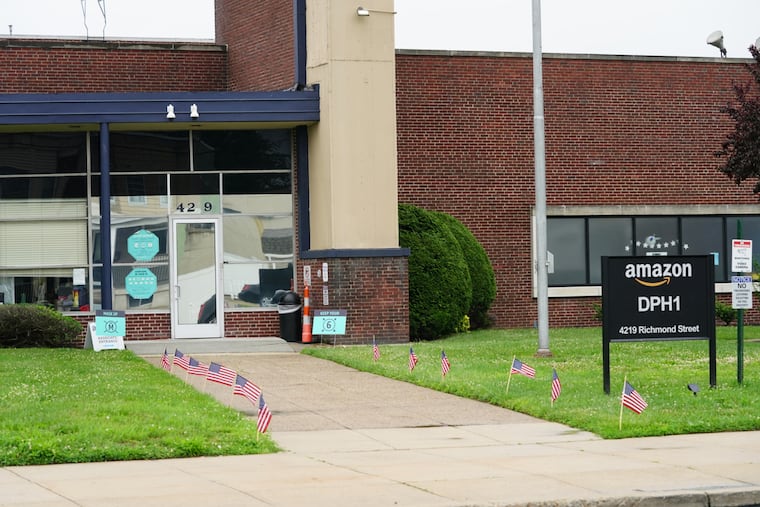Warehouse space is harder to find as the commercial real estate market heats up
Warehouse space gets harder to come by as the commercial real estate market heats up, sending rents through the roof.

Despite the persistent uncertainty of the pandemic economy, the U.S. commercial real estate market continues to thrive, with “record-high asking rents driven by historically low vacancy amid robust demand for space,” according to real estate investment firm CBRE. Thanks to higher ecommerce demand, industrial rents in some areas of the Philadelphia region have increased as much as 20% as of mid-year.
Ty Martin, a managing partner at McCann Commercial Real Estate in Philadelphia, said that the office space market also is performing better than expected, with both leasing rates and square footage leased staying “around the same” as pre-pandemic. He said that many of the small and mid-sized companies in the area have had most of their employees come back to the office and a good number of companies are changing their internal designs to accommodate more safe spaces for returning workers.
“Before COVID, we saw a ton of people go with open office concepts,” said Martin. “But now we’re seeing a shift back to where people are very segmented off in private offices and back workstations with cubicles again, which takes up more space.”
Run on warehouses
As well as the regional office space market is doing, it’s the industrial warehouse space — particularly for properties with 5,000 to 10,000 square feet — that’s been extremely strong.
» READ MORE: Amazon now encircles the Philadelphia region with over 50 warehouses
“That market is very, very hot,” said Charles Swope, who runs Swope Lees Commercial Real Estate in West Chester. “We have significantly more demand than supply for that sector. Our customers are paying record pricing in terms of leasing and purchases.”
According to Swope, much of the commercial space is being gobbled up by larger players but there are plenty of opportunities for small businesses, as long as they’re prepared to do what a landlord requires in order to get a great location.
For example, both commercial property owners and commercial Realtors are looking for businesses with a good financial track record and will require tax returns, financial statements, bank records, and credit checks to prove it. Leasing agents particularly like businesses that are motivated because they need the location and space to accommodate a new contract, a recent acquisition, or business growth that is pushing them to expand. No commercial property owner or agent offering space wants to take undue risks or speculate.
“It’s not to say that we don’t work with start-ups,” said Swope. “But you need to have a history and prove that your business is credit worthy.”
Small retailers face tighter real estate market
The world has also changed for small retailers. Many landlords now lean toward more “experience” type businesses where what’s offered can’t be purchased online. This is why we see so many more yogurt shops, cafes, restaurants, and workout places in shopping districts and fewer merchants selling shoes or clothes.
Regardless of what you’re selling, most landlords will want to see how a tenant plans to pay its rent over the longer term. Martin insists that his customers do their best to understand what they can afford and take the time to project their sales and costs. He often digs deep into a potential tenant’s business model.
“If you’re going for a high foot-traffic area, that’s great,” he said. “But how often will you convert? And from the standpoint of what you’re selling, how many products do you need to sell at what price to cover your rent, and then still make the profit margin that you want?”
» READ MORE: How Amazon treats Bridesburg residents could be a sign of what’s to come in Philly
These are the kinds of questions a landlord or real estate agent will ask. Martin frequently advises customers to consider other factors, rather than just foot traffic, when determining a location.
“Most barbershops, for example, operate on word of mouth because a lot of people don’t walk down the street and say, ‘I’m going to go get my hair cut in here.’” he said. “So maybe in that situation, you don’t need such a high foot-traffic area and can instead get a more affordable space.”
In addition to financial projections, it’s common for landlords to require a minimum five-year commitment with an expectation of annual cost increases of about 3% to 5%, according to Swope and Martin. Many leases also come with some negotiation around the sharing of any construction or retrofit costs required for occupancy.
Because of today’s competitive market, commercial landlords are requiring more transparency from their tenants. That’s because each party is taking a long-term risk and it’s why both Martin and Swope want to work with customers who can prove they have a future revenue stream that can cover their costs, including their rent, and generate profits.
The market, as well as the added complexities of leasing space, have also motivated some real estate firms, like Martin’s, to offer services where they independently represent a tenant for a stand-alone fee that’s normally paid by a landlord. That way, a small-business owner who is less savvy about the market can lean on an expert to help determine the best location, research the best rates, and finalize a favorable contract.
“Having a tenant representative as a teammate alongside of you and understanding your business is going to help you negotiate the best lease you can,” he said.
Gene Marks is a certified public accountant and the owner of the Marks Group, a technology and financial management consulting firm in Bala Cynwyd.